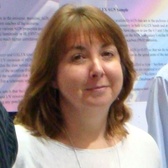

Niles West High School, Skokie, Illinois
11, 12
Ms. Ramseyer was among the first NITARP teachers.
Many people helped with the review of the 2023 NITARP teams' proposals. Thanks to you all! People at IPAC who helped included:
Despite the global pandemic, many NITARP alumni helped us out with reviewing the NITARP 2020 proposals! Scientists who helped include Tiffany Meshkat, Patrick Lowrance, Mike Werner, Seppo Laine, and Julian van Eyken. Thanks to all!
Both NITARP 2014 teams submitted research proposals. Several NITARP alumni helped review them.
Congratulations to NITARP alums Elizabeth Ramseyer and Rich DeCoster on the opening of the Niles West Observatory!! Through their hard work and dedication to their students and the study of astronomy, a new observatory will be dedicated next Wednesday, October 23 from 6 to 7:30 pm at Niles West.
Vivian Hoette and Kevin McCarron presented a NITARP poster at the Illinois Science Teachers Association meeting in October 2011. They also gave a talk on our NITARP science and education.
Elizabeth Ramseyer, Peggy Piper, and Richard DeCoster also included NITARP in talks given at the ISTA.
The Niles West teams presented their education posters to the Chicago Section of the AAPT April 9th. Approx 30 people were there.
The Niles West teams presented to the school board and audience (at least 30 people) both of their Science Posters.
Ms. Ramseyer attended the AAS meeting as part of her team starting up, and writes that one of the big things she learned was from the NSF public policy session: "NSF talk was interesting in that I found that there was so little money awarded." She also learned about some work with Girl Scouts and is investigating using some of those activities with her local troop.
The 2010 class has been selected!
Turner and Kolb's Dark Matter/Dark Energy talk was a big hit with my students. They had many questions afterwards. [...] The information received in the lecture showed my students that there are so many more questions to answer in our Universe. I believe it also opened their eyes to the life of an astronomer/researcher. [...] I think it also was an invaluable experience for them to see that it is "ok" to ask questions. Questions are what drives science. [...] [I] will enjoy finding excellent tidbits [out of the materials I collected] to use in [my] classroom.